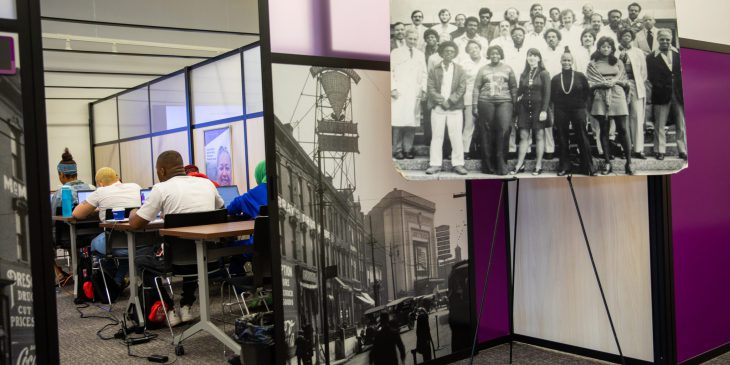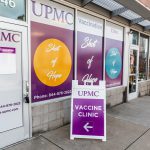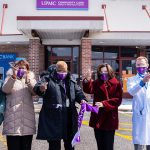In the 1960s, the city of Pittsburgh was one actively divided by race, with neighborhoods largely segregated. This segregation played a critical role in the city’s out-of-date emergency response time. It was out of this setting that an innovative solution for emergency medical care was born – one that continues more than 50 years later as the namesake of another transformative program UPMC has undertaken to help build the community and diversify the healthcare workforce.
The Freedom House program was first formed in Pittsburgh’s Hill District during the late 1960s as a response to the palpable racial tension and urgent need to improve the city’s emergency response time. Freedom House was an unprecedented experiment that relied on the very community members that needed the program to succeed the most.
The concept was revolutionary and paved the way for other EMS programs throughout the country.
Through a partnership with Presbyterian University Hospital, now UPMC Presbyterian, Freedom House recruited local community members and gave them a full emergency medicine education. At the helm of their training was Peter Safar, MD, who is also known as the “father of CPR.”
With Dr. Safar’s guidance, and the needs of the community never greater, Freedom House went on to create one of the first ambulance service programs in the country, serving the region between 1968 and 1975.
Today, a program called Freedom House 2.0 carries on its founder’s legacy and aims to better serve our communities through the creation of new opportunities to diversify the health care workforce. These opportunities are created by recruiting, training, and employing underserved and economically disadvantaged community members, just as the original Freedom House did years ago. Freedom House 2.0 stands upon the fundamental understanding that no one is better positioned to serve a community in need than one of its own members.
Overcoming Adversity
Freedom House 2.0 was developed in 2020 amidst a year full of challenges, uncertainty, and fear. With a nationwide focus on the pandemic difficulties and racial inequity, its return couldn’t have happened at a better time.
The COVID-19 pandemic highlighted disparities within the social determinants of health and shed light on how those determinants affect education and employment opportunities. With funding from UPMC Health Plan’s partnership with Partner4Work, part of the Allegheny County Workforce Development Board, secured amid the pandemic, Dan Swayze, vice president, Community Services, UPMC Health Plan, recognized the opportunity to honor the original Freedom House’s legacy by structuring Freedom House 2.0 to serve its current community more effectively.
Through a continued partnership with UPMC, and guided by the vision of Trevor Mathey, project manager, Community Services, UPMC Health Plan, and Emily Lovallo, MD, Emergency Medicine, UPMC Mercy, Freedom House 2.0 offers students a tuition-free, five-week training program. The curriculum introduces them to the health care basics, teaches them about the community health worker role at UPMC, and focuses on job preparedness.
The program takes a grassroots approach to recruiting, by posting fliers at community organizations, homeless shelters, and benefits offices, and through word-of-mouth from other graduates. This approach to recruitment ensures that the program remains accessible to community members in-need. Interested applicants can scan the QR code on the flier or email the Freedom House 2.0 service account for a link to apply. Applicants then take part in a brief interview to ensure the program will be a good fit.
The program’s priority is to make students feel fully supported throughout, so that they can focus solely on their training and career preparation. Each student receives a stipend for personal expenses, as well as computers, classroom essentials like pens and notebooks, meals during classes, and uniforms. A peer-support specialist works with students to address any further social determinants or health barriers.
Dan says that with Trevor and Emily’s commitment to their vision, they’ve created, “an accommodating space to meet students where they are in life and help them through whatever they need in order to succeed in the program.”
It Takes a Village
Freedom House 2.0 offers a true sense of community to each student, which was exactly what Lemuel Coleman, community health intern, UPMC Health Plan, needed when his journey to Freedom House 2.0 began.
In true grassroots recruitment fashion, Lemuel first heard about the reinstated program at Freedom House through word of mouth. He never previously thought about a career in health care but found himself open to the possibility when his personal life took a turn.
Lemuel had spent five years working as a solar foreman when his mother passed away suddenly in November 2021. Lemuel was encouraged by his employer to take some necessary time off to grieve his loss, only to be told a few weeks later that there was no longer a position for him.
“It was the worst. I felt so manipulated,” Lemuel said. While the loss of both his mother and his career left him reeling, he didn’t allow either to defeat or define him.
Instead, he reached out to his mentor, who presented him with two different community-driven opportunities, one of which was Freedom House 2.0.
Lemuel was familiar with Freedom House’s history, so when the timing aligned for him to join his cohort, he took the chance and hasn’t looked back since, saying, “I’m so glad I jumped at that opportunity.”
While transitioning into health care was an intense career adjustment, Lemuel shared that Trevor and Emily created a supportive environment that revolved around understanding, which helped him immensely as he continued to grieve personally and transition professionally. And once the program progressed into the community health worker position curriculum, Lemuel knew he had found his niche.
He loved being able to give back to his own community and said he knew firsthand what it was like to need assistance getting back on his feet. “I just felt that if I could be on the other end, helping another person, that would be great
Giving Back
Lemuel isn’t alone in his desire to give back to his community. That drive was instilled in Markisha Jones, community health worker, UPMC Health Plan, as well. Markisha had always been intrigued by the prehospital setting and knew that she wanted to give back to her community through health care.
Prior to her time at Freedom House 2.0, Markisha enrolled in an EMT course and was fascinated by the training, specifically the ride-alongs, where she had the chance to arrive on-scene and experience her trainings firsthand.
“Being the first one there on a call or in an emergency just got my adrenaline going,” said Markisha.
While she didn’t immediately end up in an emergency services career, her EMT training and her passion for health care eventually led her through the doors of Freedom House 2.0, where she was given a chance to explore her interests further and discover where she felt best in the health care field.
Markisha praised Freedom House’s accommodating nature and said the allotted resources made for a fulfilling experience where the focus is truly on helping students thrive and further their education and employment opportunities.
As a single mom of two young kids, flexibility was also a key factor in Markisha’s success at Freedom House. The teachers ensured that she was able to balance being the sole caretaker of her children and the program’s workload by helping her catch up on assignments if she was late or needed to leave early to fulfill her children’s needs.
That flexibility and understanding extended even after she graduated from Freedom House 2.0 and began her role as a community health worker. Markisha highlighted her one-on-one meetings with her manager, explaining that her manager checks in often to ensure she is doing well both at work and at home.
Being able to work in a role that allows her to pursue her passion while also fully supporting her family is something Markisha appreciates most, saying she feels like she’s “… exactly where I’m supposed to be.”
Life Changing Is Our Community
UPMC’s partnership with Freedom House 2.0 furthers our commitment to our communities. Life Changing Medicine begins in our own backyards, and UPMC is determined to strengthen and nurture its relationship with its community members. Since Freedom House reopened its doors in 2020, approximately 60% of the total graduates have been placed into jobs at UPMC. A recent cohort celebrated their graduation this past March.
This investment in our community’s workforce development not only helps students go through the program, but it also allows us to diversify our health care workforce and continue the important work of reducing disparities in health care in the regions UPMC serves.








